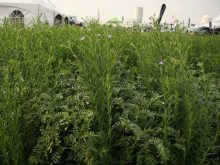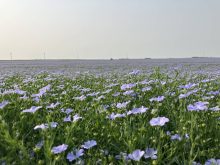A major U.S. grain company has expanded its flax-processing presence in Saskatchewan.
Scoular has installed high-speed processing equipment and expanded storage capacity at its plant in Richardson, Sask., near Regina.
The company initially opened the flax plant in January 2022. It was the first new flax facility in Western Canada in nearly 10 years.
Scoular also operated a pulse processing plant at the facility, but earlier this year the company announced it was quitting the pulse business.
The processing and storage assets at Richardson are now solely dedicated to flax. The company has 39 grain bins at the site that can hold 280,000 bushels.
Read Also

Saskatchewan looks to expand trade in Indonesia
Saskatchewan intends to increase its agricultural partnership with Indonesia.
There are now three processing lines dedicated to flax, double what was in place before, as the pulse processing lines have been retrofitted.
The plant now has 50,000 tonnes of annual flax processing capacity.
Another improvement is faster and more efficient outbound loading for truck and rail.
Robert Deraas, general manager of flax for Scoular, said the plant will service farmers in a 200-kilometre radius.
“We’re buyers in the flax market today and we’d like everyone to know that,” he said.
The company sees flax as a “mainstay” crop for Saskatchewan producers and is excited about growing consumer awareness of the crop’s health benefits, such as being a non-GMO source of omega-3 fatty acids and fibres.
In a recent article published on Scoular’s website, Flax Council of Canada president Rick Mitzel said the plant expansion is a positive for the industry and for growers.
“The indications are that flax demand is growing,” he said.
But Canada is receiving a shrinking piece of that pie, according to LeftField Commodity Research analyst Chuck Penner.
He told delegates attending the Saskatchewan Flax Development Commission’s annual general meeting in January that Canada is losing significant market share to the expanding Black Sea flax industry.
“I wish I had better news for flax, I really do because I’ve always wanted it to work,” he said.
“I’m not writing it off, but it’s going to be a tough slog.”
He said Canada is no longer the driving force in flax markets. Russia produced an estimated 1.5 million tonnes in 2022-23 and Kazakhstan added another 800,000 tonnes.
By comparison, Statistics Canada estimates Canadian farmers grew 267,900 tonnes of flax this year, the smallest crop since 1967.
Deraas said he thinks the crop is slightly larger than that, at 300,000 tonnes. There was another 200,000 tonnes of carry-out entering the 2023-24 crop year, resulting in a “normal” supply of 500,000 tonnes.
He expected there will be about 420,000 tonnes of demand for Canadian flax.
“We’re going to have carryover, but carryover will decline,” he said.
Flax prices are well down from last year’s highs, but they bounced back somewhat recently when Statistics Canada revealed its disappointing average yield estimate of 18 bu. per acre.
Bids for brown flax range from $15.50 to $17 per bushel, while golden flax is fetching another $2 to $3.
“I expect (prices) to stabilize where they’re at today,” said Deraas.
“I think we’re there.”
The Richardson plant produces whole and milled flax for a range of applications including breads, snacks, oils, supplements, pet food and livestock feed.
The plant also has organic certification.
















